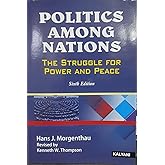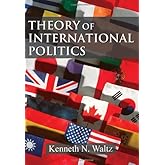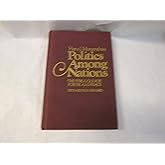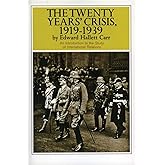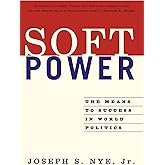
Download the free Kindle app and start reading Kindle books instantly on your smartphone, tablet, or computer - no Kindle device required.
Read instantly on your browser with Kindle for Web.
Using your mobile phone camera - scan the code below and download the Kindle app.

Follow the author
OK
Politics Among Nations 7th Edition
The new edition preserves intact Morgenthau's original work while adding a 40 page introduction by the editors who explore its relevance for a new era. What follows the introduction are the perspectives of a dozen statesmen, scholars, and observers each offering insights on Morgenthau's concepts and ideas as they relate to current crises on every continent. They bring up to date the dialogue that began in 1948.
- ISBN-10007289539X
- ISBN-13978-0072895391
- Edition7th
- PublisherMcGraw-Hill Education
- Publication dateApril 19, 2005
- LanguageEnglish
- Dimensions7.5 x 1.2 x 9.1 inches
- Print length752 pages
Customers who viewed this item also viewed
Product details
- Publisher : McGraw-Hill Education; 7th edition (April 19, 2005)
- Language : English
- Paperback : 752 pages
- ISBN-10 : 007289539X
- ISBN-13 : 978-0072895391
- Item Weight : 2.4 pounds
- Dimensions : 7.5 x 1.2 x 9.1 inches
- Best Sellers Rank: #1,076,148 in Books (See Top 100 in Books)
- #352 in International Relations (Books)
- #6,017 in Political Science (Books)
- #8,287 in International & World Politics (Books)
- Customer Reviews:
About the author

Discover more of the author’s books, see similar authors, read book recommendations and more.
Customer reviews
Customer Reviews, including Product Star Ratings help customers to learn more about the product and decide whether it is the right product for them.
To calculate the overall star rating and percentage breakdown by star, we don’t use a simple average. Instead, our system considers things like how recent a review is and if the reviewer bought the item on Amazon. It also analyzed reviews to verify trustworthiness.
Learn more how customers reviews work on AmazonTop reviews from the United States
There was a problem filtering reviews. Please reload the page.
- Reviewed in the United States on April 24, 2023Hard to find and mondo expensive. But indispensable if you want a solid grounding in discussions of international relations. Not left or right. “Realism” was effectively created by this book. No substitutes for it.
- Reviewed in the United States on May 27, 2011This is a well written, clear and sharp presentation of the philosophy of political realism in international relations. It is a classic in its field. It can be read easily enough by any educated reader with an interest in power and modern history.
- Reviewed in the United States on August 22, 2022Very clear and well presented, this is a book of high quality amongst the large body of works in this field.
- Reviewed in the United States on June 26, 2018Good
- Reviewed in the United States on March 8, 2014Morgenthau is an essential foundation for anyone interested or occupied in international relations or national security. Some hold that his perspective is out of date; yet the flow of history since the Peloponnesian War to the events in the Middle East, East Asia, and the Ukraine today provides clear evidence that successful statecraft as portrayed by Morgenthau requires the correlation of interests and power. A must have for professionals.
- Reviewed in the United States on December 22, 2021fair price & great condition!
- Reviewed in the United States on September 7, 2018Ordered for my granddaughter.
- Reviewed in the United States on May 28, 2003I was taught politics initially by a professor from the University of Chicago who studied under Han J. Morgenthau, who used Morgenthau's book, Politics Among Nations: The Struggle for Power and Peace as his primary text. Later, when I taught politics, I found that this text was a bit too advanced for the calibre of beginning undergraduate students (my, how the standards, they slippeth...) but was useful for a third-year course in international relations.
This book is heavy in history and philosophy as well as a more 'pure' political science; these are not disconnected subjects, and should not be treated as such. Morgenthau was one of the giants of international thought, having trained many (directly or through texts) of the last generation of political scientists, who rarely have a neutral opinion on Morgenthau. Very much an adherent of the Real Politick, and addresses the question of framework and theory at the beginning of the text:
Morgenthau, throughout this work, strives to work against the idea that international politics in particular, and politics more generally, can be derived simply from philosophical or abstract points, and must be grounded in the imperfect and very human dealings at hand. He outlines six principles which guide this political realism:
1. There are objective laws that govern politics, rooted in human nature.
2. The main force driving international politics is the concept of interest defined in terms of power.
3. This key concept is universally valid and objective, but does not have the same meaning fixed once and for all.
4. Political realism is aware of the moral significance of political action.
5. Political realism refuses to equate the moral principles of any given nation or time with the overall moral laws that govern the universe.
6. Political realism maintains a separation and integrity of intellectual substance, while recognising other frameworks and the inter-relatedness of politics with other fields.
Morgenthau goes through a lengthy discussion of these principles as the underpinning of his theories, before embarking on the 'nitty-gritty' of international politics. He includes an essay on scientific methodology as it applies to politics, and the limitations of this methodology.
Morgenthau then proceeds to discuss politics under the following broad headings:
- International Politics as a Struggle for Power
This includes a look at political power, imperialism in different guises, status quo issues, prestige, and political ideologies. Take imperialism as an example: Morgenthau examines the reasons for imperialistic tendencies (victorious war, lost war, and weakness, perceived or real); the ultimate goals of imperialism (which could be global empire and hegemony, continental empire, or merely local preponderance); and the differing methods of imperialism (military, economic, cultural).
- National Power
In this section, Morgenthau discusses military, political, population, national morale, natural resource, and quality of government issues to determine national power structures, and examines the problems attendant with nationalism. He also discusses the typical errors of political analysis, those of mistaking the absolute character of power, the permanent character of power, and the fallacy of single factors (geopolitics, nationalism, militarism, etc. in isolation).
- Limitations of National Power: Balance of Power
- Limitations of National Power: International Morality and World Public Opinion
- Limitations of National Power: International Law
Morgenthau proceeds to discuss in these sections the various factors which hold nations in check. The first section encompasses balance of power issues, including models of competition and direct opposition; different methods of balance of power; and the uncertainties and unrealities of balances of power. The next section discusses the strength of philosophical underpinnings and morality as a deterrent, as well as the tension between personal and political morality, national and international morality, and universal moralism and nationalistic universalism. The final section here discusses legislative, judicial, and enforcement aspects of international law, and the limitations of international law due to sovereignty issues, as well as executive limitations.
- International Politics in the Contemporary World
For this section, we have to rely mostly on Kenneth Thompson's reconstruction of Morgenthau's thought, given the necessity for updates. The issues discussed earlier are brought into relief as a framework for discussion of balance of power, the disappearance of colonialism, the relative declines of the established powers, and the issues surrounding the century in which total war has become the standard.
- The Problem of Peace: Peace through Limitation
- The Problem of Peace: Peace through Transformation
- The Problem of Peace: Peace through Accommodation
These three final sections examine issues such as disarmament, security and international policing, judicial settlements, alliances (looking at the successes and failures of past alliances and organisations), culminating in a candid discussion of the United Nations, both in theoretical (charter) terms and actual practice. Transformative issues include possibilities of world statism, world communalism, and interlocking spheres of cooperation and unity. The final section deals with diplomacy, as both a real and a declining force in politics today.
Morgenthau is as likely to pull an example from Thucydides as he is from World War II. This makes this a difficult book for the typical undergraduate, who today does not have the historical frame of reference to appreciate such examples. Morgenthau's reasoning is subtle and elegant, and still of great influence today. One might count the likes of Kissinger and Thatcher among those who would generally adhere to Morgenthau's thesis.
Not at all for the faint hearted, but a text that will yield treasure to the bold who would explore a text that is indeed formative of much of diplomatic and political thought from the 1940s through the 1980s, hence having an impact on events and organisations still important today.
Top reviews from other countries
-
 Client d'AmazonReviewed in France on February 14, 2023
Client d'AmazonReviewed in France on February 14, 20235.0 out of 5 stars Commande bien réceptionnée !
Commande bien réceptionnée - Livre en très bonne état ! Pleinement satisfaite !









